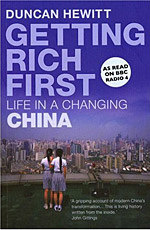On September 18 at 7:30 PM at the Beijing Bookworm, an English language bookshop, library and café, Mr. Duncan Hewitt presented a lecture on his new China book, Getting Rich First.

Mr. Hewitt, the former BBC Shanghai bureau chief, has lived a long time in China. In 1986 he began his career of China watching as a Chinese language student in Xi'an; currently he lives in Shanghai. Tall, slim and articulate, Mr. Hewitt discussed the content of his book and outlined the major changes China has experienced in the last fifteen years.
"When I first came to China in 1986," Mr. Hewitt said, "People knew where they stood. China was a 100 percent Communist country. Beijing seemed like an ancient, sleepy capital. The state controlled everyone's lives. In the last fifteen to twenty years amazing changes have happened in China. It's almost a free-for-all society and this so-called Communist country is as modern as anywhere in the world. Shanghai has been redone, almost rebuilt into a super modern city. In fact my cell phone works underground in the Shanghai metro; the British have yet to get that kind of technology."
Mr. Hewitt explained that he wrote his book to help other foreigners and China watchers to understand the incredible changes that are transforming China. "Many tourists have remarked to me: China just doesn't seem very Communist," he said. "I wanted to document the different phases that Chinese society has gone through, to make sense of how it was and what it is now. My book is titled after Deng Xiaoping's famous lines during his second southern tour in 1992. That's when social change really began to speed up."
With the advent of Deng Xiaoping's economic reforms the state began separating itself from many areas of life that it had formerly controlled. The result was great social upheaval. This process caused mixed feelings: the Chinese people were glad to have freer, more independent lives but at the same time they had to become more responsible for their own lives as well. Social reforms in health care, urbanization and youth culture: the country has been experiencing these transformations at an amazing pace.
"England, after World War II, took forty years to develop and modernize; China has taken only 15 years," Mr. Hewitt said. "When the changes started the government was focused on economic development. Many loopholes in the social safety net appeared. The Chinese people experienced a huge shock: workers were laid off; people lost heir pensions; hospital coverage disappeared. All these things take time to revise. Many people felt lost and left out, especially the older generation, the people who had been caught up in the Cultural Revolution."
Mr. Hewitt also compared China's development to that of the Eastern European countries. "In Eastern Europe, when the Berlin Wall came down, everything changed. But in China the Communist Party still rules the country amidst all these forces of modernization. Morality has been altered, especially among the younger generation, and social problems have been created by the economic reforms. The country must deal with the issues revolving around urbanization and industrialization – what is the role of the Party now? Do the Chinese people still believe in communism?"
Mr. Hewitt's book examines in depth these problems, these transformations, and what the Chinese people think about their changing society. The book features numerous interviews with Chinese citizens living all over the country. Young people, old people, peasants and rich businessmen all speak through his book. Vital issues: morality campaigns, property rights, the validity of the rule of law – are highlighted.
"The big question is," said Mr. Hewitt in his concluding remarks, "is whether the current government will accept civil society?" How effectively the Communist Party evolves and leads this rapidly changing country remains a global question.
(China.org.cn, September 19, 2007)
